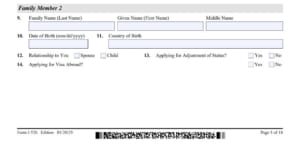 Enterline and Partners recently obtained an I-601 Waiver of Inadmissibility for a client who was refused an immigrant visa. The client, who is married to a U.S. citizen, was previously charged with fraud/misrepresentation and sought our legal assistance in order to be reunited with her family.
Enterline and Partners recently obtained an I-601 Waiver of Inadmissibility for a client who was refused an immigrant visa. The client, who is married to a U.S. citizen, was previously charged with fraud/misrepresentation and sought our legal assistance in order to be reunited with her family.
The I-601 Waiver of Inadmissibility process took a little under 1 year and was heavily documented to show that the client’s U.S. citizen spouse would suffer extreme hardship if the client would be prevented from immigrating to the United States. Following approval, the client will now be eligible for a new immigrant visa interview allowing her to depart to the United States.
Immigrant visa applicants located in Asia who have been refused an immigrant visa and would like to avail of a Waiver of Inadmissibility are highly recommended to contact us at info@enterlinepartners.com and speak with a U.S. immigration lawyer in Ho Chi Minh City, Manila and Taipei.
ENTERLINE & PARTNERS CONSULTING
Ho Chi Minh City, Vietnam Office
3F, IBC building
1A Cong Truong Me Linh Str.
District 1, HCMC, Vietnam
Tel: +84 933 301 488
Email: info@enterlinepartners.com
Facebook: Enterline & Partners – Dịch vụ Thị thực và Định cư Hoa Kỳ
Website: http://enterlinepartners.com
Manila, Philippines Office
Unit 2507 Cityland 10 Tower 1
156 H.V. Dela Costa Street
Makati City, Philippines 1209
Tel: +632 5310 1491
Email: info@enterlinepartners.com
Facebook: Enterline and Partners Philippines
Website: https://enterlinepartners.com/language/en/welcome/




